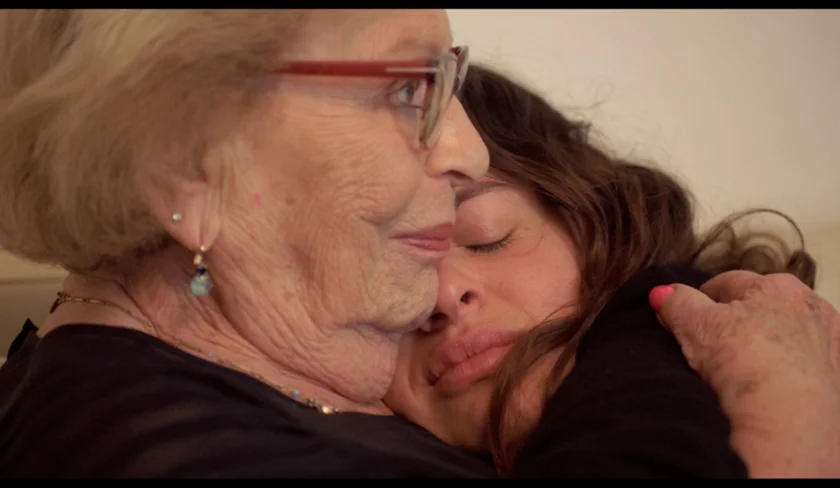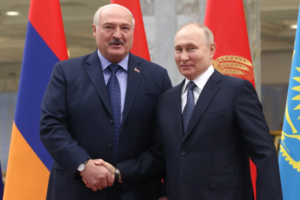What started as a series of short films in which Julia Wallach talked about her life in Auschwitz led to an acclaimed movie and a book deal. Filmmaker-actress Frankie Wallach talks about her now-legendary gran and creating a surprise success
French filmmaker Frankie Wallach felt the need to showcase her 97-year-old grandmother as more than “just another” Holocaust survivor. So she cast her in her debut movie “Trop d’amour,” which also co-stars the director and her father, and skillfully captures the daily lives of three generations of French Jewish survivors, including their fights, laughs and neuroses.
At just 25, Frankie Wallach has the confidence of those driven by passion. That’s presumably what gave her the chutzpah to pursue high-powered film producers for funding, despite having zero track record in filmmaking.
Her career in entertainment began at age 10 and saw her land various acting gigs as a teenager. After finishing high school in her native Paris and studying film theory at King’s College London, she resumed acting a few years later after returning to her hometown. https://www.youtube.com/embed/nH_ZoIjwbjg?start=0&controls=1&loop=0&modestbranding=1&rel=1&autoplay=false&enablejsapi=1&mute=false
“Trop d’amour” trailer (in French)
But being an actress did not completely satisfy the creative urge, so she started directing short films starring grandmother Julia Wallach cooking knaidlach and talking about her eventful life. Then came the idea of making her first feature, starring her grandmother and her father as themselves.
“Trop d’amour” (“Too Much Love,” but known as “Starring Grandma” in English) is half documentary, half dramedy, and captures the complexities of life for second- and third-generation Holocaust survivors, and the relationships they have with their families.
Like many other families, the Wallachs fight a lot, don’t agree on much and when Frankie tries to involve them in her project, she is the subject of heavily criticism.
In one of the film’s most memorable scenes, she leaves the family home after a fight with her siblings, who are trying to convince her to let go of both the film and the past they believe she clings to. She goes to a club and dances until dawn. As she wanders drunkenly through the streets of Paris, she decides to introduce her boyfriend, a young Muslim artist, to her grandmother.
Julia welcomes them with a cup of tea and starts recounting horrific memories from her time in Auschwitz. And that’s where the movie magic happens, as the heady enthusiasm of youth encounters the wisdom of age.

Fewer inhibitions
Frankie Wallach believes third-generation Holocaust survivors help their grandparents by transforming their heritage – something she says the second generation is unable to do as they lack the necessary distance, having been raised directly by a survivor and bearing all the guilt and suffering that entails.
The third generation, however, has a broader perspective, which allows them to sublimate their grandparents’ trauma, whether by discussing their story with fewer inhibitions and less pain, or by relaying it through art, words or education, she asserts.
“I like to think that we only get the ‘good side’ of the trauma,” Frankie says. “We share the same legacy as our parents, but without guilt and suffering. Well, not completely, but much less than the second generation. It’s like getting everything in small doses, with only one duty: never forget, and never let other people forget. We, the third generation, are passeurs,” she adds, using a French term for “transmitters of history.”
And what about Generation Z and their relationship to the Holocaust? “Many young people in France have never heard of the Holocaust,” Frankie says. “But since the film was released [last autumn], I’ve received a lot of requests from young YouTubers and influencers who wanted to learn more and talk about it on their platforms.”
Her generation, she continues, is allowed to talk about the Holocaust differently on social media, noting that no one her age would choose to visit a Holocaust museum.
“The way they speak about the Holocaust is less inhibited, less formal. But they keep talking about it, and that’s what matters,” she says. “Any project dealing with the Holocaust in whatever way – whether it’s the recent film ‘A Radiant Girl,’” directed by Sandrine Kimberlain, which tells the story of a 19-year-old Jewish girl living a carefree life in 1942 Paris before the Jews were rounded up by the French police and sent to the concentration camps, “or Simone Veil’s biopic [‘Simone, the Journey of the Century,’ about the French politician and Holocaust survivor] or Instagram accounts – will help ensure the legacy of the Holocaust victims and survivors,” she adds.
The young filmmaker knew she was taking a chance when she chose to make a film about the life of her Jewish family. In French movies, she notes, the Jewish identity of a character will always define the entire story. And movies featuring Jewish characters will automatically be categorized as “Jewish films” that are specifically for Jewish audiences.
Indeed, following the film’s release, Frankie Wallach says she was only offered acting roles playing Jewish characters. She passed on them all, fearing it would categorize her as a “Jewish actress” or “Jewish filmmaker,” in a country only too keen to put people in pigeonholes.
Her stance ultimately paid off as she was offered and accepted a part in the next production by high-profile French filmmaker Michel Gondry, “Le Livre des solutions” (“The Book of Solutions”).
The Parisian says that although she expected to receive some antisemitic comments following the film’s release – “We are in France after all!” – she was pleasantly surprised not to receive any. What she received instead was praise, which also surprised her. Leading French daily Le Monde wrote that the film had transformed Frankie Wallach into a director and helped perpetuate her grandmother’s legacy.

‘Sense of urgency’
It has been quite the journey considering that “Trop d’amour” began with a simple request on Frankie’s Instagram account. There, on June 14, 2019 (the date of her grandmother’s birthday), she asked her followers to help her raise money through a crowdfunding platform. She initially asked for 5,000 euros ($5,260), even though she had no idea how much the film equipment might cost to hire. “I just randomly thought up a number and ended up collecting 20,000 euros,” she laughs. “My sense of urgency is what drew people to the project. I couldn’t wait any longer because my grandmother wasn’t getting any younger. They probably were impressed by the absolute necessity I had of capturing and perpetuating my grandmother’s legacy.”
After receiving a generous budget, Frankie got to work. She wrote the script in August 2019, shooting in September and editing until March 2020. During those months, a producer she had gone to for advice agreed to back her, even though she hadn’t directed anything before.
“They believed in my motivation, my energy and my passion,” she says. “I had already chosen a cast before my producer agreed to back me, and knew what and where I would shoot the scenes. But the script was so poorly written that we had to rewrite it for days until we started filming,” she recalls.
She knows that the film owes a lot of its success to her grandmother’s incredible personality. Prior to the shoot, Wallach posted various short films starring Julia on social media, which drew lots of positive reactions. Her sense of humor and wisdom even saw her crowned as the unofficial “granny of social media” by watching youngsters.
Julia Wallach’s Holocaust story began on July 16, 1942, when her mother was arrested in their Parisian apartment (where she had returned to pay the rent) while her father was hiding out in the village of Bry-sur-Marne. She was taken to Drancy – the major transit camp for the deportation of French Jews – and sent to Auschwitz on August 31. Julia never saw her mother again.
Julia and her father were later arrested by the French police in Bry-sur-Marne and sent to Drancy. They were subsequently put on convoy 55 (there would be 77 in total) and arrived at Auschwitz-Birkenau two days later, where she was immediately separated from her father. She hoped he would be employed by the Nazis as he knew how to work leather. However, she later learned that he was sent to clean up the Warsaw Ghetto and was murdered after completing the task.
It took Julia 20 years to start sharing her memories. She initially told her family and then later would visit schools and talk to high school students. When the film was released domestically last October, she was invited onto several TV shows and was interviewed by several major French newspapers about her life.
“She did a great job promoting the film – so much so that a renowned publishing house contacted her,” Frankie says. “They’d watched Julia’s TV interviews and the film, and asked her to write a memoir about her two years in the camps.” The book’s title, “God Was on Vacation,” has sparked some criticism within the Jewish community for “questioning” God’s existence during the Holocaust.
Julia also received the Légion d’honneur (Legion of Honor) earlier this year – the highest French civil or military order of merit – for her work informing youngsters about the Holocaust.

“Of course, she was thrilled and grateful” to receive the award, her granddaughter says, “but it won’t alleviate her anger toward France and the French for their role during the occupation. She could even say something like, ‘If they think they can fool me with this medal and that it will wash away their sins, they can think again!’”
On a more positive note, Frankie believes the award symbolizes long-overdue public recognition for Julia’s suffering.
When asked about her grandmother’s next adventure, the filmmaker says she will be her wedding witness this summer. “And who knows? Rihanna might invite her over for lunch someday!”




